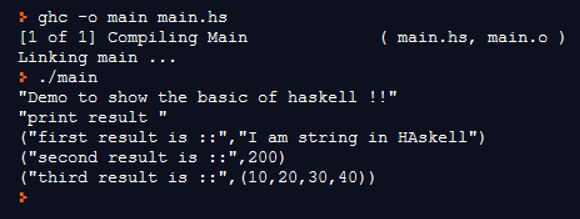Updated May 31, 2023
Introduction to Haskell
The following article provides an outline for Haskell Uses. Haskell is also a general purpose programming language but it is a functional programming language, it also based on the lambda calculus. It was launched in 1990. If we write a program in Haskell it will always represent in the form of mathematical functions, these function have their benefits. Haskell is strictly typed language like java , c, c++ so it is very easy to check the error at compile time only. Functional programming language are more and more concurrent, hence provide better performance as well. Haskell has been developed to handle the multithreading very effectively.
Different Haskell Uses
Haskell is an functional programming language which comes up with many features such as lambda calculus, support for strong multithreading which makes it good use for various application sector, Also Haskell is an general purpose programming language, which can be used in any sector or we can say domain.
We have some areas where it is best suited for the developers to use:
1. Data analysis: As we all know that data analysis is the process by which we can get the useful information by applying some of the steps defined. In the process we try to model data, transform it, inspect it and cleansing it in order to get the desired output we want, so Haskell is useful in data analysis applications. By the use of data analysis we can take business decision more effectively.
2. Performance: As we all know that it is an functional programming language an good support for multithreading programming which turns helps us to get the good performance of the application, so we can use Haskell where fast and seed up requirement is needed most. Also in the banking domain we require concurrent programming with good support, so we can say that Haskell is an good choice for this sector too.
3. Scalability: If we talk about the scalability it is very much need by any application in the real world, we may have some different requirement after words, so our system should be scalable and does not dependent on the modules very much. So Haskell provide us this feature also to make the system scalable when we want it to be, this is also an requirement for the most of the application now a days.
4. Proprietary business
5. Fast prototyping
6. Enhancing and improvement in the existing software application: By the use of Haskell we can improve the existing application by making it more scalable, improve its performance, also we can speed up the development which increases the productivity of the developers and helps us to deliver the application little bit fast.
7. Data intensive: First lets see about what data intensive applications are, these applications are responsible to handle large set of data which is in petabytes and terabytes, and these datasets stored in various locations. So if we have this kind of application which has to handle this much data then we can go for Haskell in that case, let’s have a look at some names for data intensive industries which has already start using Haskell.
- Online Consumer
- Big Pharma
- Biotech
- Financial Services
- Oil and Gas
8. Research and development project: This can be also done by using Haskell programming.
9. Applications in healthcare domain a well-known.
10. Helps to debug application at very easy: Haskell is a functional programming as we already know now so this provide the advantage of ease of maintenance and also high modifiability in the application. One more advantage Haskell provide is that if you want to developed specification or prototype in Haskell so this can be easily executed, debugged and tested as well.
Example of Haskell Uses
Given below is the example of Haskell Uses:
Here it is an sample piece of code how we can write a basic program using Haskell. Also in this example we tried to use the various data type that we have in Haskell.
Code:
main = do
print("Demo to show the basic of haskell !!")
let demovar1 = "I am string in HAskell"
let demovar2 = 200
let demovar3 = (10, 20 , 30, 40)
print("print result ")
print("first result is ::", demovar1)
print("second result is ::", demovar2)
print("third result is ::", demovar3)Output:
Benefits of Using Haskell
Given below are the benefits of using Haskell in any application domain:
1. In Haskell, programs are written as the series of high-level generalization which helps us to know what is the purpose and what is intended to do after execution.
2. It is an strongly static type programming language which helps us to identified the error at the compile time only, Haskell compiler forces to correct the code, clean it and make it correct.
3. It is used by many companies out of which some of them mentioned below:
- Barclays
- Amgen
- Research and development project at Facebook, Google, Microsoft and Twitter.
4. It is also used in the healthcare industries where developers are writing applications for doctors and patients, which helps them to track activities.
5. Haskell programming language uses and provide iterative methodology.
- By the use of this we can update and make modification to the program dynamically.
- Also provide support for control structures.
Conclusion
Haskell is used in many domain as we discussed above, also provide and comes up with various in-built features which makes it good choice for the developers of any domain. In order to understand its usage we should very well versed with the features it provide, also we have seen some examples and standard in Haskell, to write and start with programming.
Recommended Articles
We hope that this EDUCBA information on “Haskell Uses” was beneficial to you. You can view EDUCBA’s recommended articles for more information.



